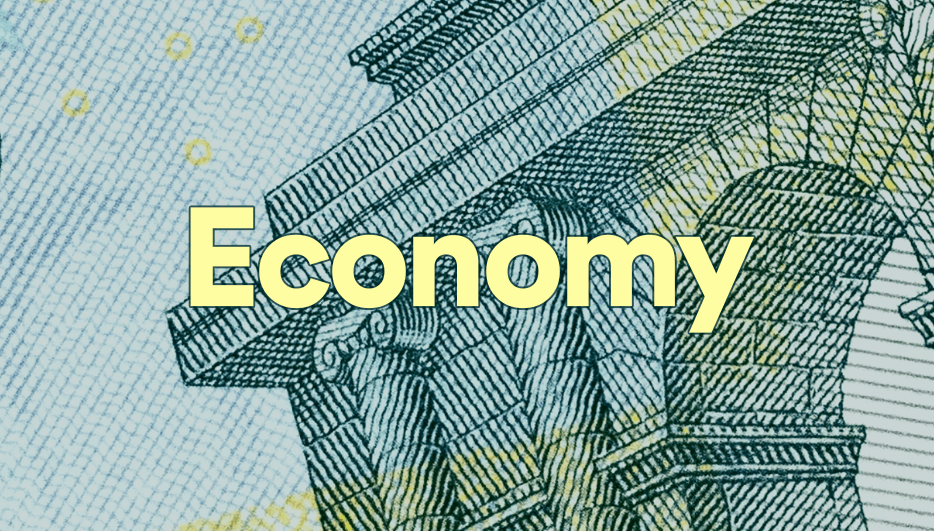For those reading this blog post that are familar with LootLocker's development, you might remember us talking about a Multiple Currencies feature way back when we began development of an update to our initial currency implementation. During the development of this feature we realized that what we really needed to build was actually a lot more complex and that calling it simply Multiple Currencies wouldn’t do the scope of the feature justice at all.
Well, to that end, I am super excited to finally announce the release of a new feature today - a feature that has been in development (on and off) for almost 3 years now. A feature we're calling Economy.
So, what is it that makes this feature so great and worth the wait? Well, to explain that we must first start with a brief introduction to game economies!
What are Game Economies?
To understand the power of our new Economy system, it's important we first understand how game economies work.
Simply put, game economies are virtual trading systems in games. That's it. They're not only about using real (or virtual) money to buy things, they can be all types of transactions happening in a game. Any time where something is traded for something else can then be viewed as a transaction inside of a game economy.
For example, in a turn based battle system in an RPG, you could explain the core loop as buying an attack in exchange for a resource; in this game's case - a turn. So every time it’s the player's time to attack, the player is granted one resource (a turn) that they will then use to buy an attack. Same goes for health systems. You buy an attack which in turn exchanges damage for enemy health until the enemies resource (health) is depleted.
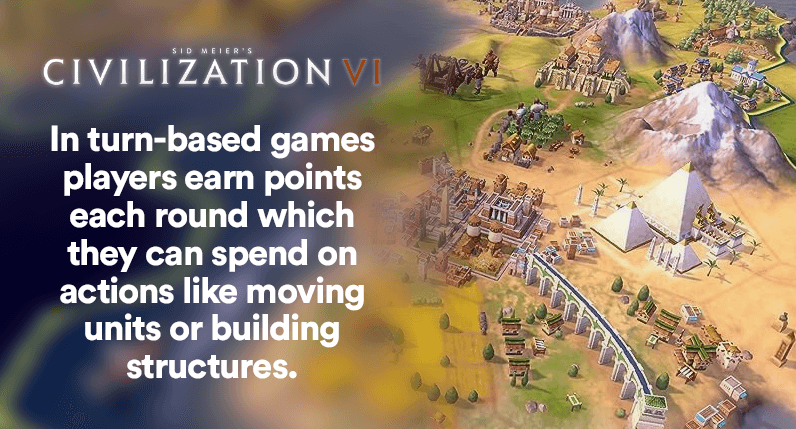
While some game systems might be harder to imagine as economy systems, at their core most of them can be broken down that way. It can be very helpful to think of them like that when balancing your game.
Got it? Great. Let's move on.
LootLocker's Economy System
With all the introduction stuff behind us, understanding our new Economy system should be a walk in the park! Let's start by breaking down the Economy system into all the different features that it comprises of.
Currency
At the core of the Economy system are Currencies. You can create as many Currencies as you'd like and even assign denominations to them. Many games, especially free-to-play mobile games have several currencies that players collect when completing the game loop. Some of these currencies are earned frequently, some are earned in more rare cases, and some currencies can only be purchased through the in-game store.
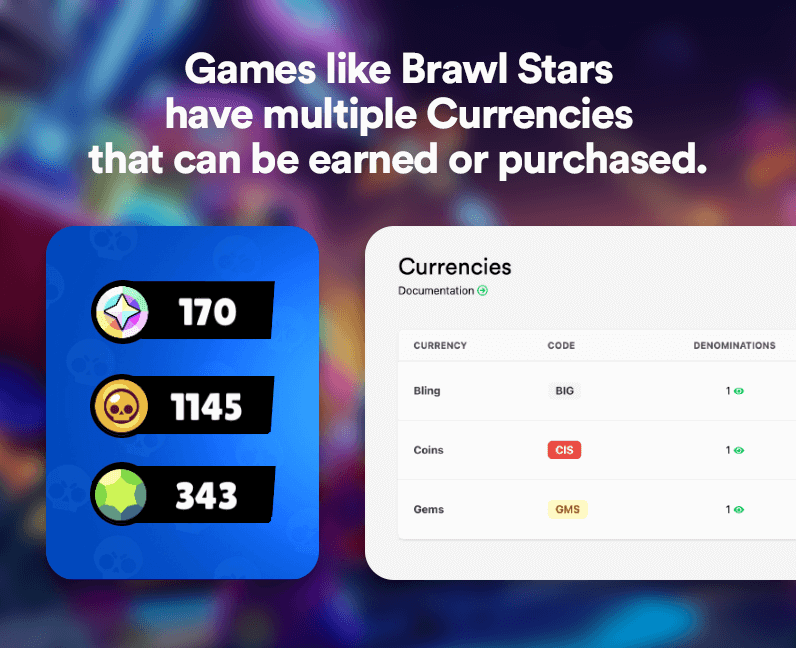
In some cases a game might have a currency like in World of Warcraft where players collect copper, silver, and gold coins as loot. These coins are all part of the same currency but are considered different denominations. Copper is the base denomination which all other denominations are built upon. Silver is 100 Copper, and Gold is 100 Silver (aka, 1,000 Copper). This is all possible with our Currency feature. And you can make as many Currencies as your game needs.
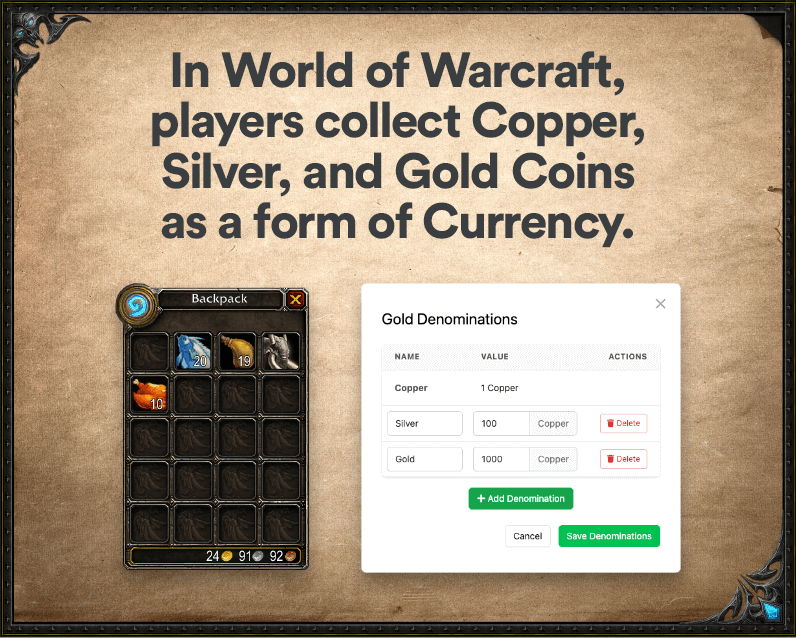
Catalogs
Catalogs are used to add Currency values to something that can be purchased, for example an Asset, Progression, or even another Currency. A Catalog can contain multiple different things or simply just one Asset. Keep in mind that a Catalog is not limited by what it contains. This means that the same Asset or Progression Point (or Progression Reset) can be purchased for different Currencies within the same Catalog.
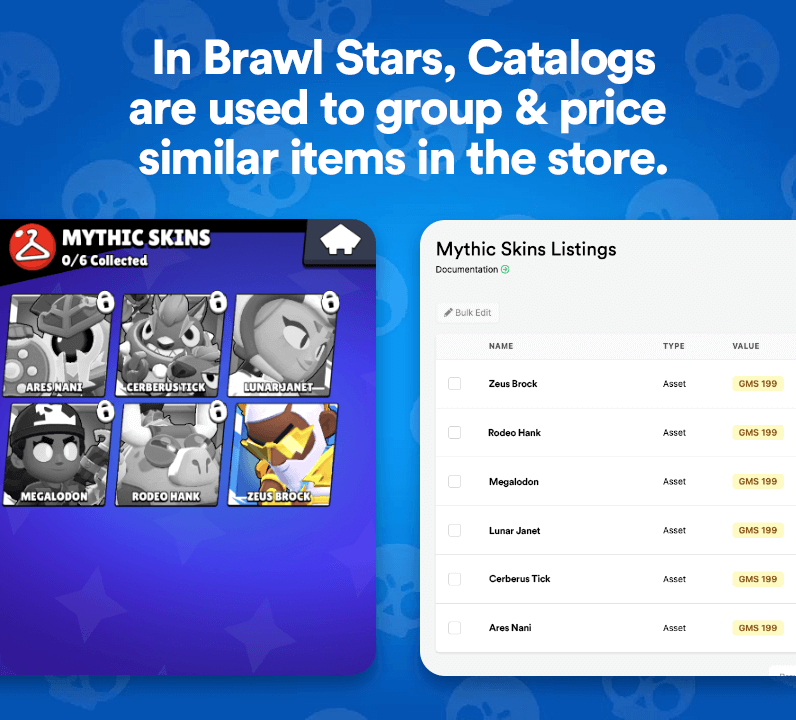
Of course Catalogs can be used for an in-game store (or, to group items more easily within the same in-game store) or simply to add a value to a handful of Assets relevant to a game system. A great example of Catalogs in action are vendors in a game like World of Warcraft. Many vendors have a different selection of Assets to buy. Each, sometimes with different prices than other vendors. This makes finding a rare vendor even more exciting. This kind of game system can be easily supported by creating and assiging a different Catalog to each vendor.
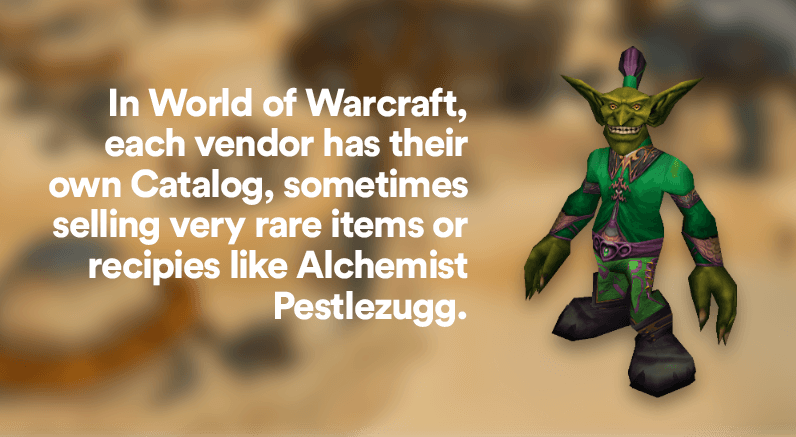
Wallets
The Currencies that a player owns are stored in that player's Wallet. Only the logged in player and the server can change the Currencies in the Wallet, so all transitions made will be safe and secure. That being said, we have provided the option to allow the game to write directly to the player Wallet, but recommend against this as it will be prone to cheating.
You can view a player's Wallet through the player management menu, or request the balance of the Wallet throught the SDK or API.
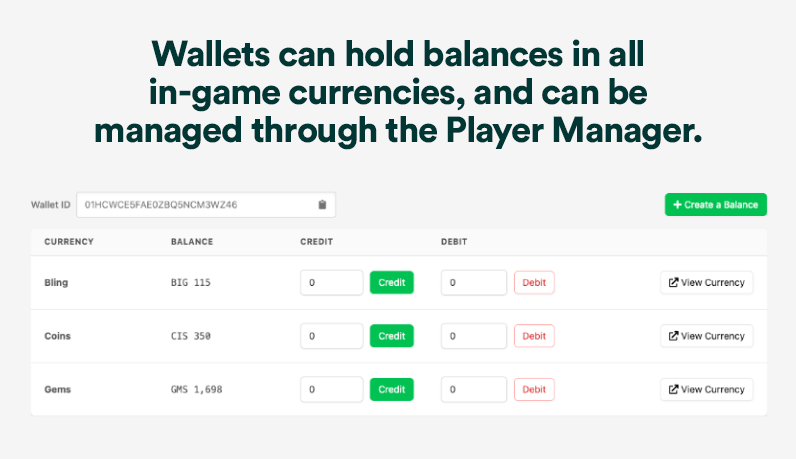
Rewards
Another feature which has been improved by our new Economy system are Rewards. We first introduced Rewards when we launched our updated Progressions systeme earlier this year. Rewards are a fundemental system within LootLocker whereby many systems are connected together (eg Progressions can reward Assets). With the release of our Economy system we have updated Rewards to now include Currencies. So now you can select the following systems as a Reward:
- Progression Points
- Progression Resets
- Assets
- Currencies
Within the Economy system the concept of Rewards is part of creating a Listing within a Catalog. A Listing is an individual entry of something to be purchased for a specific amount of Currency.
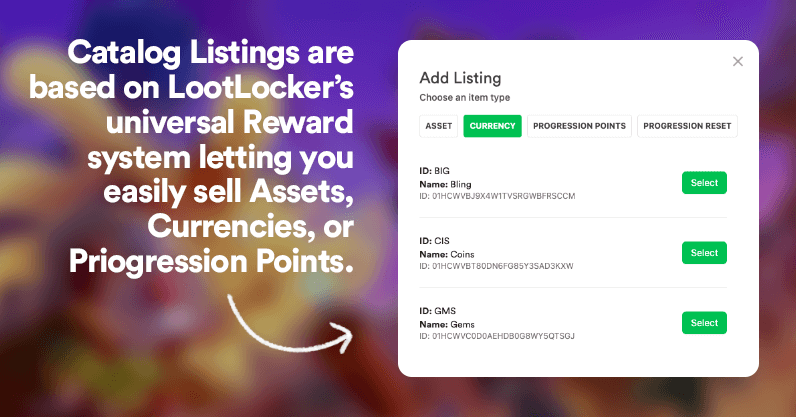
Coming Soon
While we're excited to get our new Economy system in the hands of the community, there is still a lot more work to be done. An economy system can power entire games, so we want to make sure LootLocker's Economy system has all the bells and whistles on it. So consider this the first of several releasing coming your way!
In future update we plan to address the following features that didn't make it into the first release:
Triggers
We plan to rebuild Triggers from ground up in order to better support Currencies and Rewards, as well as more use cases than currently are avaiable. For now you will need to use the Server API to grant Currencies to players, or enable game writes.
Loot Boxes, Drop Tables & Currency Packages
Our legacy implementation of Currency lets you create Currency Packages as a Context. These packages can then be added to Loot Box rarity groups and Drop Tables. Given our new Reward system mentioned above, we will need to revisit these features in order to support the new Economy system.
First Party Platform Payments
Being able to purchase virtual currencies with hard currencies through traditional platforms (Steam, Apple App Store, Google Play Store etc) is vital for many games as it's often their sole source of revenue. We will be adding platform support on an ongoing basis, starting with the most popular platforms first.
Get Started with Economy
Aright, so there you have it. Our brand new Economy systme is live and ready to support your game. We've got a lot more work to do and look forward to your feedback.
Helpful Links
In addition to this blog post, we've already released a guide with some use cases for our Economy system. You can also find the regular materials below:
- Download SDK for Unreal Engine and Unity 3D
- Economy System User Documentation
- 3 Ways to Use Our Economy System Guide
API Reference Documentation:
Feedback Welcome
We want to hear from you! What works, what doesn't work. What do you like, what do you dislike. What do you think is missing from this Economy system? Please share feedback through our dedicated Economy Feedback forum post on our Discord.
